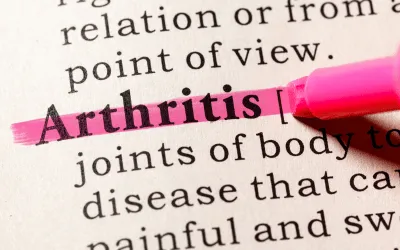About Arthritis
As the nation’s #1 cause of disability, arthritis affects nearly 60 million adults and 300,000 children. Over 100 types of arthritis and related conditions damage the joints and often other organs.
How can we assist you?
Helpful Tools for You

GERD and Rheumatoid Arthritis: A Surprising Connection That Could Protect Your Joints
Did you know that a common digestive issue, Gastroesophageal Reflux Disease (GERD), could significantly increase your risk of developing Rheumatoid Arthritis (RA) by over 40%? 😲💥 It’s an eye-opening revelation, especially for those managing or concerned about joint health. A recent study published in Scientific Reports highlights a clear genetic link between GERD and RA, shedding light on a fascinating gut-joint connection that could reshape how we approach prevention and management of these conditions. 🧬
At the American Arthritis Foundation, we’re committed to bringing you the latest research and insights that can help you live healthier, more informed lives. This new study opens up exciting possibilities for early intervention and better preventive care for both GERD and RA. Let’s dive into the details!
What is GERD?
GERD is a chronic digestive disorder where stomach acid frequently flows back into the esophagus, causing irritation. Common symptoms include heartburn, acid reflux, and discomfort in the chest. While GERD is often regarded as a digestive issue, research now shows its impact could extend far beyond your gut – to your joints. 🦠
The Link Between GERD and Rheumatoid Arthritis
The Scientific Reports study found that individuals genetically susceptible to GERD are at a 41% higher risk of developing RA. This is a significant discovery that challenges traditional thinking about the relationship between digestive and joint health. 💡
RA is a chronic autoimmune disorder that causes inflammation, pain, and swelling in the joints. The new study suggests that GERD might be a trigger for this inflammatory process in people with certain genetic predispositions. The connection seems to be rooted in how GERD-induced inflammation can trigger or exacerbate joint inflammation, leading to RA.
However, the reverse isn’t true—having RA doesn’t increase your risk of GERD. This distinction is critical, as it offers new pathways for preventative strategies targeted at managing GERD to potentially prevent or delay the onset of RA.
What Does This Mean for You?
For those managing or at risk of RA, this research emphasizes the importance of taking care of your digestive health. Here’s why:
GERD Raises RA Risk by 41%: The genetic susceptibility to GERD can trigger joint inflammation, increasing your risk of developing RA. 🚨
Understanding the Connection: Knowing how GERD influences joint health allows for better RA prevention strategies and treatment plans. 🛡️
A Holistic Approach to Well-Being: Taking care of your gut health doesn’t just help with digestive issues; it may also protect your joints from developing RA. 🌿💙
What You Can Do to Protect Your Gut and Joints
Maintain a Healthy Diet: Eating gut-friendly foods can reduce the risk of GERD. Focus on high-fiber foods, lean proteins, and healthy fats, while avoiding triggers like spicy foods, caffeine, and alcohol. 🥦🍗
Manage Stress: Stress is a known trigger for both GERD and RA flare-ups. Mindful practices like yoga, meditation, or even daily walks can help reduce stress and improve both gut and joint health. 🧘♂️
Stay Active: Regular exercise supports overall health, but particularly helps with digestion and joint mobility. Opt for low-impact activities like swimming or cycling to avoid putting extra strain on your joints. 🚴♀️
Talk to Your Doctor: If you’re experiencing frequent heartburn, acid reflux, or joint pain, it’s important to consult with your healthcare provider. They can help assess your risk and guide you in managing both GERD and RA.
The Future of RA Prevention
This new discovery reinforces the importance of a holistic approach to managing chronic conditions. By understanding the genetic link between GERD and RA, we can not only improve prevention strategies but also empower individuals to take control of their health through lifestyle changes that benefit both their digestive system and joints. 🦠💪
At the American Arthritis Foundation, we believe in empowering you with knowledge. Whether you’re dealing with heartburn or joint pain, taking care of your gut health might just be the key to protecting your joints, too. Don’t stop at treating one condition—consider the bigger picture and how your overall well-being is interconnected. 🙌
Take care of your gut, and you could be protecting your joints in the long run! 🌿💙 If you found this helpful, be sure to share this article and follow us for more health tips and insights.
Effects of Arthritis

Cause of Disability
In the United States, 23% of all adults, or more than 54 million people, have arthritis. It is a leading cause of work disability, with annual costs for medical care and lost earnings of $303.5 billion.

Workforce Effects
Sixty percent of US adults with arthritis are of working age (18 to 64 years). Arthritis can limit the type of work they are able to do or keep them from working at all.

Global Impact
In fact, 8 million working-age adults report that their ability to work is limited because of their arthritis. For example, they may have a hard time climbing stairs or walking from a parking deck to their workplace.
Promoting Interventions That Reduce Arthritis Pain
American Arthritis Foundation recognizes several proven approaches to reduce arthritis symptoms:
Be active. Physical activity—such as walking, bicycling, and swimming—decreases arthritis pain and improves function, mood, and quality of life. Adults with arthritis should move more and sit less throughout the day. Getting at least 150 minutes of moderate-intensity physical activity each week is recommended.
Protect your joints. People can help prevent osteoarthritis by avoiding activities that are more likely to cause joint injuries.
Talk with a doctor. Recommendations from health care providers can motivate people to be physically active and join a self-management education program. Should your arthritis be interfering with your activities of daily living you may be a candidate to receive many new treatments, and learn how to reverse the arthritis condition.
Have a question?
We're Here to Help
By providing my phone number, I agree to receive text messages from the business.

